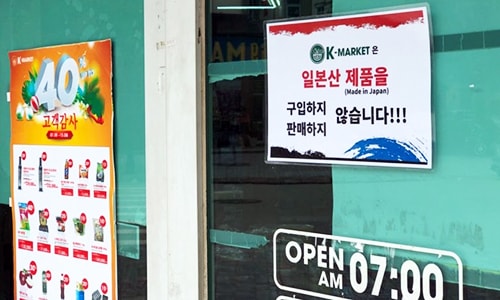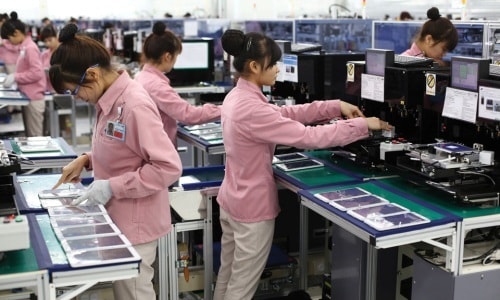What are the risks for Vietnam in the Japan-Korea trade tension?
As part of the global electronics value chain, Vietnam's trade balance may decline, but the impact will not be as great as the US-China trade war.
Tra My, a Vietnamese student studying abroad, often goes to the Uniqlo store in the Myeongdong shopping district (Seoul, South Korea) on weekends and joins the long lines to pay. But in recent weekends, Tra My did not have to wait in line because the store was deserted even though it was the sale season. This is the result of the boycott campaign against Japanese goods launched by Koreans after Tokyo ordered restrictions on the export of three important materials used in the production of semiconductor products to Seoul.
The boycott does not stop in Korea. In Hanoi, Tu Anh, an office worker, was very surprised when he went to the K-Market supermarket on To Huu to buy a type of Japanese tea but was refused. The staff there showed him a notice that the entire system had stopped selling Japanese products since the beginning of August. K-Market is a chain specializing in serving Korean customers living in Vietnam. In addition to main products from Korea, the supermarket previously sold products from Vietnam, China, Thailand...
|
A K-Market supermarket in Nam Tu Liem area, Hanoi announced that it does not sell products of Japanese origin. Photo:Mr. Tu. |
Tokyo’s export restrictions are not just triggering trade tensions and boycotts. According to Vo Tri Thanh, former Deputy Director of the Central Institute for Economic Management (CIEM), the global supply chain of technology equipment, including Vietnam, is likely to be disrupted. “Vietnam has opened up and joined the global playing field, so it could be affected because it is part of this chain,” he said.
In a recently published study, Dragon Capital Securities (VDSC) assessed that Vietnam's production, export and trade balance activities may be affected. Items related to semiconductors and screens such as computers, phones and cameras account for about 35% of total exports; phone components account for 20%. "Therefore, when the export of these items is affected, Vietnam's trade balance of goods may decrease," VDSC commented.
According to the General Department of Customs, in the first 7 months of 2019, South Korea was Vietnam's third largest export market with nearly 3 billion USD, up 6.4%. Exports of computers, electronic products and components to South Korea reached nearly 1.6 billion USD. In the opposite direction, Vietnam also imported 10.2 billion USD of computers, electronic products and components from South Korea, up 3% over the same period. And more than 2.5 billion USD of phones and components from the land of kimchi.
Not to mention, South Korea and Japan ranked 2nd and 4th respectively among the countries investing the most in Vietnam in the first 7 months of this year, with total investment capital of 3.1 billion and 2.25 billion USD, respectively.
|
Mobile phone production at Samsung Vietnam Company.Photo: AP |
Not only do electronics play a role in Vietnam’s exports and trade balance, they also contribute significantly to the manufacturing industry – the main growth driver in Vietnam in recent years. Samsung alone has created more than 160,000 jobs for workers in Vietnam. The company is currently looking for alternative sources of supply and said it has no intention of reducing chip production.
However, CEO of Global Economics and Market Research, UOB Singapore Bank - Mr. Suan Teck Kin is more optimistic.He said that the Japan-South Korea trade conflict is mainly a supply chain relationship of a certain product, so the impact will not be as wide as the US-China trade war.
When the US or China imposes tariffs on each other's goods, it will directly affect the global economy, production and people - the end consumers. Meanwhile, the trade tension between Japan and South Korea, which is more about supply chain relations, can affect Korean businesses, specifically Samsung Group, in the electronics and semiconductor manufacturing sectors. However, with the ability to reserve goods for 3-9 months, these businesses can overcome and avoid the lowest risk from conflict pressure.
Mr. Harry Loh - General Director of UOB Bank Vietnam also said that the tension between Korea and Japan may be limited directly to these two countries. Samsung is one of the major investors and Vietnam accounts for 20% of Samsung's exports abroad, but their operations are relatively independent as each market is a separate legal entity.
Therefore, according to Mr. Harry Loh, "if any, the impact of the Korea-Japan tension on Samsung will only affect some parts and not globally."
However, with tensions between Japan and South Korea showing no signs of cooling down, Dr. Vo Tri Thanh noted that Vietnam needs to carefully monitor and assess the situation to find a solution. In addition to diversifying partners and markets, taking advantage of FTAs and increasing domestic risk management are also immediate and long-term solutions to deal with international and regional trade wars.










